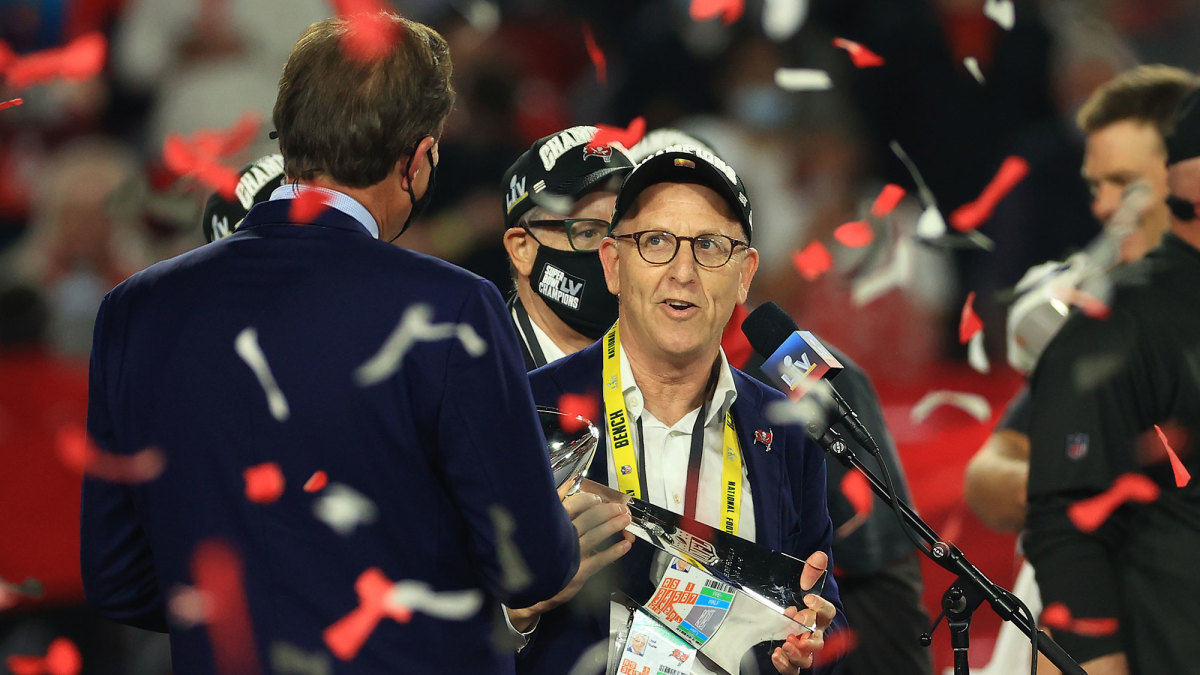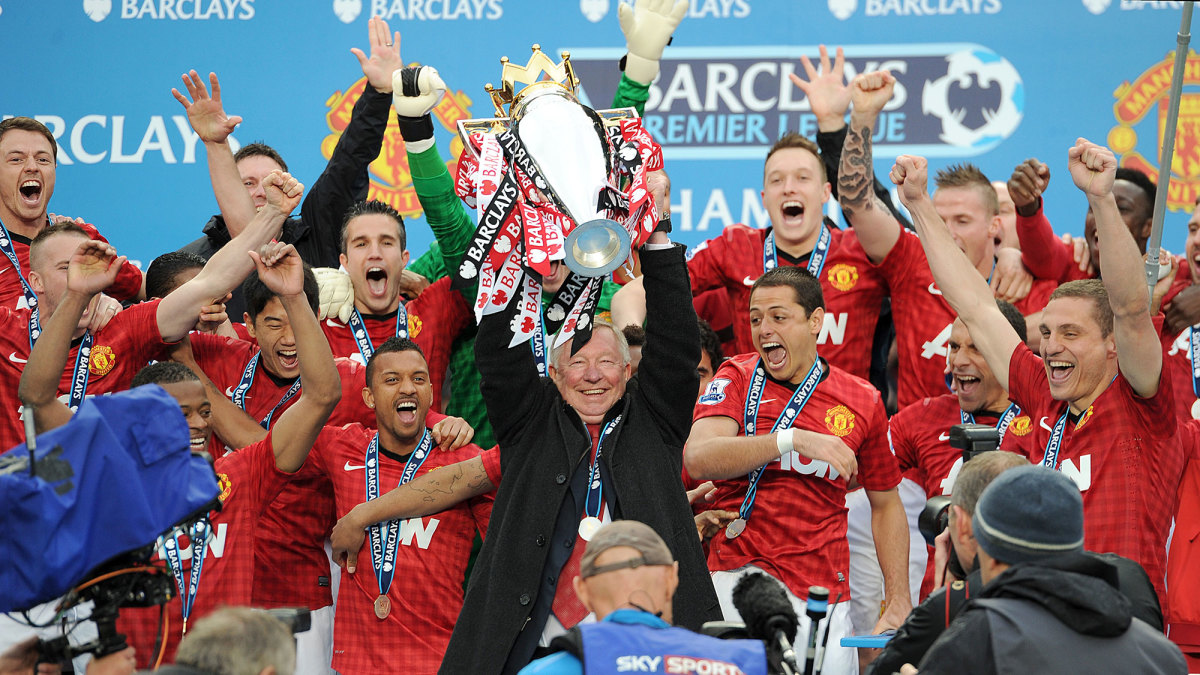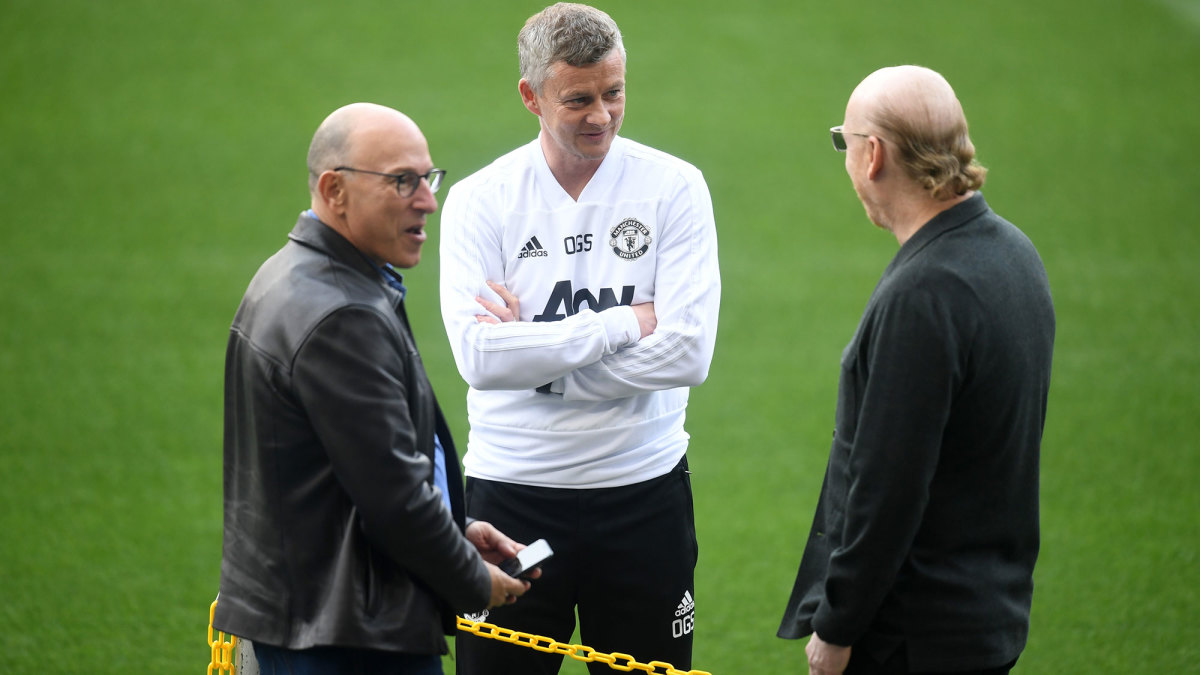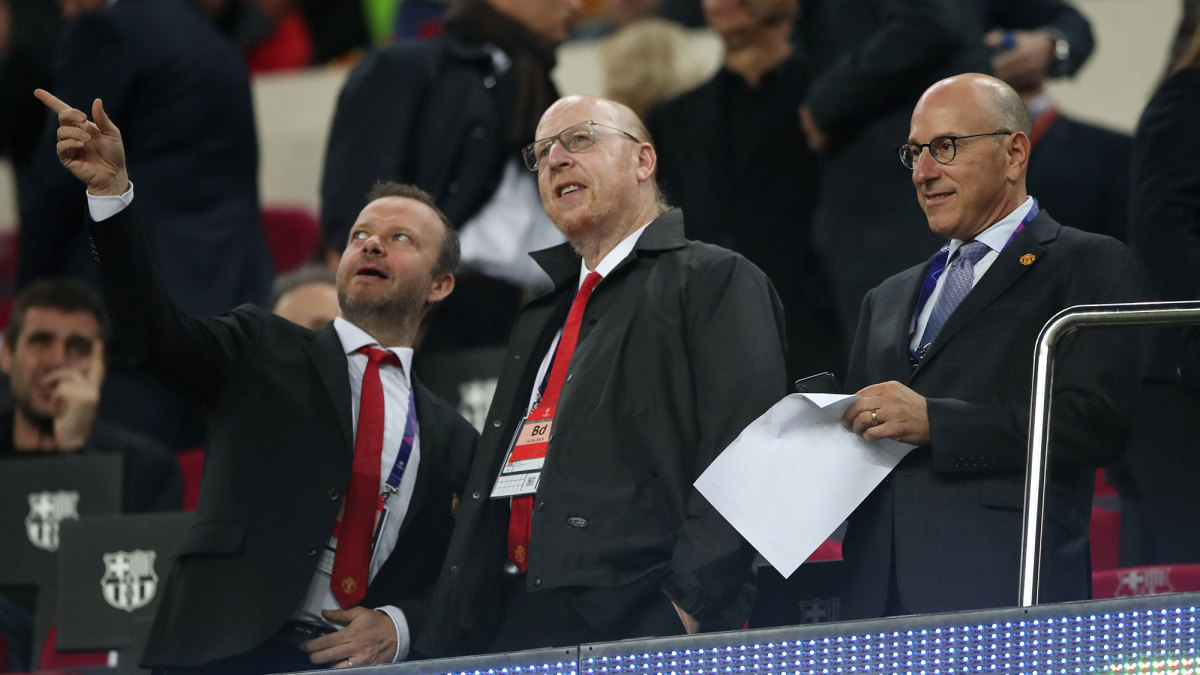The Glazers’ Brady Principle Isn’t for Manchester United
As the Tampa Bay Buccaneers won the Super Bowl on Sunday, the Glazer family, which owns the NFL franchise, took center stage.
“You know, my father had an expression,” said Joel Glazer, the co-chairman, reflecting on the decision to commit $50 million over two years to 43-year-old quarterback and Super Bowl MVP Tom Brady. “If you want to know the road ahead, ask the person who’s been there.”
A day earlier, Manchester United, the Glazers’ other sporting investment, conceded in injury time to draw 3–3 against Everton. United stands second in the Premier League table, five points behind Manchester City and having played a game more. A run of five points from four games has tempered the chatter that this season, finally, United might be about to mount a proper title challenge again. A scrappy win over West Ham on Tuesday carried the club into the quarterfinals of the FA Cup, but nobody much cares about that any more; winning the competition in 2016 wasn’t enough to keep manager Louis van Gaal in his job. Although United has won five Premier League titles under the Glazers' ownership, the club has not come close to winning any since Sir Alex Ferguson retired as manager in 2013.
There remains a lot of frustration among United supporters about the Glazer takeover in 2005, partly because of the dividends the family takes from the club—15 million pounds ($21 million) to each brother last year—and partly because, as the takeover was leveraged, there are substantial repayments to be made each year on a debt that now stands at a reported $656 million.
Interest is eating away at the money available for investment. It’s understandable that fans resent that; the debt was incurred only so the Glazers could take ownership and then milk their yearly dividends. Old Trafford these days is a tired stadium. It looks shabby. The roof leaks. By comparison with the best stadiums in the league, the corporate and media facilities are basic. The training ground needs refurbishment, and there are regular suggestions that there is a need for investment in scouting, recruitment and analytics.
Transfer spending, though, has remained relatively high, at a $1 billion net since Ferguson left. The problem is not the amount that’s been spent, it's how it’s been spent. And this is where the traditions of the club find common ground with Glazer policy in a way that is perhaps not entirely helpful.

In 1969, Sir Matt Busby retired as Manchester United manager. He was 59, but he was exhausted by the physical and emotional toll of the 1958 Munich air crash. He had become United manager immediately after the war and had put together a side that won the FA Cup and the league and then, promoting youth, had created one of the most brilliant young sides in English history. It won the league in 1956 and 1957 and in February 1958 it reached the European Cup semifinal for the second season running by completing a 5–4 aggregate victory over Crvena Zvezda in Belgrade. But on the way home, the plane crashed on takeoff after a refueling stop in Munich. Twenty-three people on board were killed, including eight players.
Busby put together another brilliant team. It won the league in 1965, but suffered a crushing defeat to Partizan Belgrade in the European Cup semifinal the following year. The European Cup had become the grail. Winning it by then was about far more than claiming a piece of silverware; it was about honoring the dead of Munich and achieving some kind of closure.
But this was when the European Cup was only for champions: United had to win the league before even getting back into the competition. It lifted itself again, and it won the league. It scored twice in the second half of the second leg of the semifinal at Real Madrid to progress. The winner came from, of all people, Bill Foulkes, one of the two Munich survivors still in the side. He was a 36-year-old center-half who had previously scored only eight goals in his professional career. The other Munich survivor, Bobby Charlton, scored twice in the final at Wembley as Benfica was beaten, 4–1, after extra time. United became the first English side to win the European Cup, and the quest was complete.
It is one of the greatest achievements in the history of sport. Quite understandably, retellings of it tend to focus on the emotions, the extraordinary release on that night at Wembley and the Russell Hotel afterwards, as Busby sang, “It’s a Wonderful World,” in the ballroom while an overwhelmed Charlton lay weeping on his bed upstairs.
But there is another story there, one that explains why, after 1968, everything went wrong so quickly, why United was relegated in ’74, didn’t win more silverware until '77 and didn’t win the league again until ’93, by which time Ferguson was in charge.

Football was changing in the early '60s, probably more rapidly than at any other point of its evolution. The back four was beginning to replace the traditional W-M system and diminishing the influence of wingers, who had always lain at the heart of the English game. Heavy defeats to Hungary in 1953 and ’54 had slapped England out of its complacency, and Brazil’s success at the ’58 World Cup had shown the back four was the future. Innovation was everywhere. In succession, the league title was won by Harry Potts’s Burnley, who used a prototype back four; Bill Nicholson’s push-and-run Tottenham; Alf Ramsey’s Ipswich Town with its withdrawn winger; Harry Catterick’s Everton with its back four; and Bill Shankly’s Liverpool with its “method football.”
Structure and systems were everywhere, but not at Old Trafford. Noel Cantwell was signed from West Ham, one of the most advanced clubs tactically at the time, and was bewildered by how old-fashioned United was by comparison.
“Give it to a red shirt?” he once said. “You don’t need a manager for that. How do you find a red shirt if you haven’t worked on it and talked about it?”
When John Giles left United for Leeds in 1963, he was amazed by how thoughtful and organized training was at his new club by comparison. Busby had been innovative in the late ’40s and early ’50s, but he was skeptical of the systematized football of the 60s. And perhaps, emotionally, he felt his job was to re-create the side that had been lost in 1958; certainly Charlton never shied from the fact that he considered that football a peak to which he was aiming constantly to return.
And yet United did win again. Ramsey’s England had won the World Cup in 1966 with no wingers; the United side that lifted the European Cup in ’68 had one on either flank: George Best and John Aston. Busby’s loose pattern was enough because, in Charlton and Best, whom he had developed himself, and Denis Law, whom he had signed, he had three of the greatest players of all time. As Aston observed, “We were the last man to win Wimbledon with a wooden racquet.” That was a team built not on systems but on brilliant individuals who could be relied upon to do brilliant things in the key moments.
The problem was what came next. By the time Busby retired, Law was struggling with a knee injury, Charlton was aging and Best was battling the personal demons that would soon overwhelm him. There was no underlying system. “Properly organized,” as Giles put it after experiencing the new football at Leeds, “the good players would be better, the poor players … could at least be functional.”
That has always been the United way. Counterintuitively for a club that has been so successful in youth development, there has never been an underlying philosophy beyond a vague belief in the value of self-expression and attacking football. United is the most successful club in English league history with 20 titles, but it has won them under only three managers: Ferguson, Busby and Ernest Mangnall. More than any other superclub, it is reliant upon having a great manager.

This is not the 1970s. The economic structures of the modern game make it almost impossible for United to be relegated. But the club has struggled since Ferguson’s retirement. None of David Moyes, Louis van Gaal and José Mourinho has convinced. The appointment of Ole Gunnar Solskjaer was a conscious act of Ferguson revivalism.
He was brought in initially as a caretaker to dispel the toxicity of the end of the Mourinho reign and was then given the job permanently after victory at Paris Saint-Germain in the Champions League. He spoke a lot about Ferguson, whom he still calls “the Boss,” and about United’s “unique spirit.” And like that treble-winning side of 1998–99, Solskjaer’s team has become a specialist in coming from behind to win, doing so eight times already this season.
Solskjaer is clearly adept as a man-manager and very good at riding the emotional wave of a game, but there is little sense of an underlying playing philosophy. Ferguson, similarly, had no great thesis of how football should be played, and his great strength was adapting as football evolved. But as football becomes ever more structured, there is a huge question about whether that is enough. Pep Guardiola, Jürgen Klopp and Thomas Tuchel all work on the cohesive interaction of the forward line; Solskjaer, in the United tradition, relies on the brilliance of individuals and their capacity to improvise. It may even be that in this season, when the compacted calendar denies the philosophy managers time to formulate and instill their plans, the more individualistic, less structured, approach is beneficial.
But what happens in the longer term? A philosophy means a club must either buy or produce players to fit that system. That, emphatically, is not what United has been doing. The transfer policy has been a mess. Different managers have different ideas. Players have been brought in to play one way, and then another. There was, for perhaps a year, a flirtation with the idea of recruiting potential and developing it, but that was soon abandoned. Only over the past year, with the signings of Bruno Fernandes and Edinson Cavani, has something resembling a coherent squad begun to emerge.
Cavani is one of those who has been down the road before, as Joel Glazer might say. He is 33 and arrived on a free transfer, although for high wages. He has been an undoubted success. But other established stars—most notably Alexis Sanchez—have not been.
Were Glazer to follow the Brady logic with United, what would that mean? Signing the 33-year-old Lionel Messi (four Champions League successes), who will be out of contract in the summer? Bringing the 36-year-old Cristiano Ronaldo (five Champions League titles), whose contract expires in summer 2022, back to the club, perhaps? Or probably most plausibly, snapping up the 34-year-old Sergio Ramos (four Champions League titles) when his contract expires in June?

The parallel, perhaps, is risky. European football is not the NFL. The demands on players are different. The financial model in Europe requires continuity of success—which is one of the reasons, of course, that the Glazers have been at the forefront of plans to form a Super League or at the very least to rejig the format of the Champions League so that the elite clubs can still derive vast revenues each year even if their level does drop.
The question in football is always: What’s next? Aging stars may have valuable experience of winning major competitions, but they invariably cost a fortune in wages and have no resale value. Juventus’s gamble on Ronaldo has been a relative failure, despite that he has continued to score goals in vast quantities since joining from Real Madrid in 2018. Juventus has not merely not won the Champions League with him but has been further away from doing so than it was before he arrived, while his presence has meant cutbacks elsewhere in the squad. And when he is gone, when his 30 goals a season are taken away, what is left? Certainly not a coherent squad that is likely to be able to compete consistently at the very highest level, at least not without major investment.
Which is not to say that the introduction of an aging champion cannot have a positive effect. The arrival of the 34-year-old Dave Mackay at Derby County in 1968 was instrumental in its rise under Brian Clough. Gordon Strachan was 32 when he landed at Leeds in 1989 and won the league three years later. Gary McAllister was 35 when he signed for Liverpool in 2000, but key to the UEFA Cup, FA Cup and League Cup treble. Andrea Pirlo joined Juventus at 31 and won four Serie A titles there.
But it is a risk, and football, particularly in the modern age, is a game that tends to favor holistic philosophies rather than celebrity transfers. And it’s not, after all, as though United is a callow team full of kids who need the guiding hand of a wise old pro. The likes of Paul Pogba and Cavani have known success, albeit not in the Champions League. What seems lacking at the moment on the football side is a coherent attacking strategy, and on the business side long-term planning and investment in infrastructure.
The Brady principle may not be applicable at Old Trafford. Indeed, a focus on established stars may already be holding United back.
